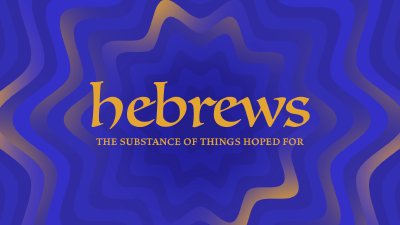


Hebrews
Things Hoped For
Purifying Blood
April 21, 2024 • Walter Henegar • Hebrews 9
The old covenant sacrificial system viscerally illustrated the truth that “without the shedding of blood there is no forgiveness of sins” (Hebrews 9:22). Jesus perfects this principle, presenting his own blood “once for all” in the true tent, the actual presence of God. This new and better covenant doesn’t just purify our bodies, but even our consciences—assuring us that we belong with him forever. For all who believe, the Bible’s constant talk of blood and sacrifice is not an embarrassing relic of primitive ages but an ongoing cause for gratitude and wonder.


The Story of Everything
April 14, 2024 • Walter Henegar • Hebrews 8
What kind of story are Christians living in? Hebrews 8 reveals a sharp contrast between the default story of human progress and the Gospel story of grace.
How Good Is Good Enough
March 24, 2024 • Walter Henegar • Hebrews 7
Everyone needs "priests" to give us authorized external confirmation that we are good enough, but all of our earthly priests will fail us, consigning us to a life of perpetual struggle. Jesus, however, is better than every priest who ever lived, even the mysterious priest-king Melchizedek, because his offering for us was final, and his prayers for us are perpetual. His once-for-all sacrifice on the cross, and his constant intercession for us at the Father's right hand, enable us to engage in the imperfect, two-steps-forward, one-step-back work of sanctification without fear.
Our Confidence in His Promise
March 17, 2024 • Walter Henegar • Hebrews 6:13–20
Why should we trust the promises of God? Hebrews 6 gives us three reasons: a compelling example, a proven principle, and a satisfying metaphor. The compelling example is Abraham, patiently (and sometimes impatiently) waited for God to fulfill his promises. The proven principle is God swearing by his own self. Though oaths like this are less relied on today, they expose the personal acts of trust at the heart of all knowing. The satisfying metaphor has three parts: an anchor, the holy place behind the veil, and a forerunner—Jesus himself. Altogether, these reasons provide those who have fled for refuge with strong encouragement to hold fast to the hope set before us.
Arrested Development
March 10, 2024 • Hebrews 5:11—6:12
It can be hard to tell the difference between an immature Christian and an inauthentic one. According to the author of Hebrews, the main difference is growth. While it is possible for people with significant spiritual experiences to "fall away," those who receive the gift of salvation by grace through faith in Jesus cannot lose it. At the same time, God wants us to keep growing into this salvation—to build on foundational practices and graduate from milk to solid food, giving us practical wisdom for every situation in life.
The Gentle Priest
March 3, 2024 • Joe Parker • Hebrews 4:14—5:10
Many of us wake up each morning weighed down by the stress of life’s difficulties, pains, miseries, and so on. The world is constantly looking for solutions, but so far every man-made effort has failed. However, Jesus met every qualification to be that better solution. He became human, with limitations, who suffered and endured weakness, just as we do. And because of this, he understands us.
The Promise of Rest
February 25, 2024 • Walter Henegar • Hebrews 4:1–13
Christians who believe the Good News of Jesus can be confident that they will one day enter eternal rest with God in the new heavens and new earth. Until then, we can also rest in God’s peace, regardless of our circumstances. But this, too, requires strenuous believing, starting with the promise that Jesus has achieved our rest for us—so we don’t have to! It also involves practicing sabbath in community, embracing our limits and letting the Gospel expose the thoughts and intentions of our hearts.
Hope When It Hurts
February 18, 2024 • Walter Henegar • Hebrews 3
When believing gets painful, Christians have a choice: Either let your heart get hardened, which is easy, or hold fast to your hope, which is hard. Thankfully, your heavenly calling was already secured for you by the Father, earned for you by the Son, and sustained for you by the Holy Spirit. This means you only have to “take hold of that for which Christ Jesus took hold of you” (Philippians 3:12 NIV). And you don’t have to do it alone. As Hebrews will keep reminding us, we must “exhort (or encourage) one another every day.”
Made Like Us
February 11, 2024 • Walter Henegar • Hebrews 2:5–18
Jesus was made like us so that we could be made like him. The author of Hebrews reminds us, citing Psalm 8, that we were made to be kings and queens, ruling God’s world on his behalf. At present, however, sin has made us slaves to the fear of death instead. To remedy this situation, Jesus had to become like us in every respect, forging bonds of shared understanding that help us to trust him. And by suffering in all these ways, even through the cross and the empty tomb, Jesus blazes a trail of transformation for us to follow.
Why Pay More Attention
February 4, 2024 • Walter Henegar • Hebrews 1:1—2:4
God is speaking to you. Are you listening? If Jesus is not supreme to you, something else will be. And you’re not paying close attention, the current will carry you away from him. But if Jesus is supreme to you, and if you are paying closer attention to what he has said, you can become an agent of his divine speech.
